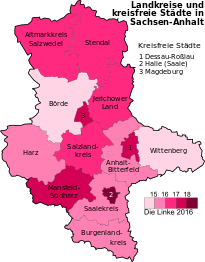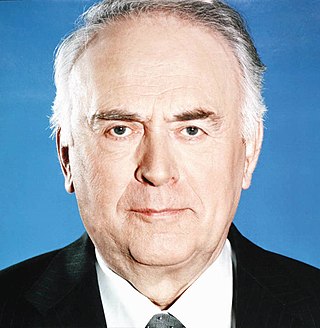
The 2002 Saxony-Anhalt state election was held on 21 April 2002 to elect the members of the 4th Landtag of Saxony-Anhalt. The incumbent Social Democratic Party (SPD) minority government led by Minister-President Reinhard Höppner was defeated. The SPD fell to third place, while the Christian Democratic Union (CDU) moved into first. The CDU subsequently formed a coalition with the Free Democratic Party (FDP), and CDU leader Wolfgang Böhmer was elected Minister-President.
Grand coalition is a term in German politics describing a governing coalition of the parties Christian Democratic Union (CDU) along with its sister party the Christian Social Union of Bavaria (CSU) and the Social Democratic Party (SPD), since they have historically been the major parties in most state and federal elections since 1949. The meaning of the term may change due to the growth of some formerly minor parties in recent years.

Reiner Haseloff is a German politician who serves as the Minister President of Saxony-Anhalt. On 9 October 2020, he was elected President of the Bundesrat. His one-year term started on 1 November 2020.
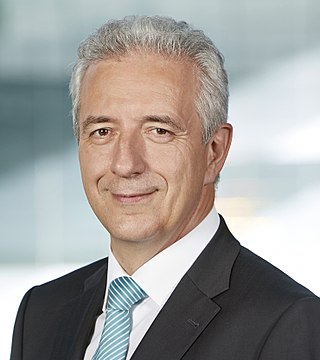
The 2014 Saxony state election was held on 31 August 2014 to elect the members of the 6th Landtag of Saxony. The incumbent coalition government of the Christian Democratic Union (CDU) and Free Democratic Party (FDP) led by Minister-President Stanislaw Tillich was defeated as the FDP lost all its seats. The CDU subsequently formed a grand coalition with the Social Democratic Party (SPD), and Tillich was re-elected as Minister-President.

The 2016 Baden-Württemberg state election was held on 13 March 2016 to elect the members of the 15th Landtag of Baden-Württemberg. The incumbent government of The Greens and the Social Democratic Party (SPD) led by Minister-President Winfried Kretschmann lost its majority.

The 2016 Mecklenburg-Vorpommern state election was held on 4 September 2016 to elect the members of the 7th Landtag of Mecklenburg-Vorpommern. The incumbent grand coalition between the Social Democratic Party (SPD) and Christian Democratic Union (CDU) led by Minister-President Erwin Sellering retained its majority and continued in office.

The 2018 Hessian state election was held on 28 October 2018 to elect the members of the Landtag of Hesse. The outgoing government was a coalition of the Christian Democratic Union (CDU) and The Greens led by Minister-President Volker Bouffier.

The 2019 Saxony state election was held on 1 September 2019 to elect the members of the 7th Landtag of Saxony. The outgoing government was a grand coalition of the Christian Democratic Union (CDU) and Social Democratic Party (SPD) led by Minister-President Michael Kretschmer.

The 2019 Brandenburg state election was held on 1 September 2019 to elect the members of the 7th Landtag of Brandenburg. It took place on the same day as the 2019 Saxony state election. The outgoing government was a coalition of the Social Democratic Party (SPD) and The Left, led by Minister-President Dietmar Woidke.

The 2019 Thuringian state election was held on 27 October 2019 to elect the members of the 7th Landtag of Thuringia. The outgoing government was a coalition consisting of The Left, the Social Democratic Party (SPD), and The Greens, led by Minister-President Bodo Ramelow.

The 2024 Thuringian state election will be held no later than between August and December 2024 to elect the 8th Landtag of Thuringia. The current government is a minority government consisting of The Left, the Social Democratic Party (SPD), and The Greens, led by Minister President Bodo Ramelow of The Left. Ramelow has proposed 1 September as a date for the 2024 state elections, however, his cabinet has yet to confirm the proposal.

The 1994 Saxony-Anhalt state election was held on 26 June 1994 to elect the members of the 2nd Landtag of Saxony-Anhalt. The incumbent government of the Christian Democratic Union (CDU) and Free Democratic Party (FDP) led by Minister-President Christoph Bergner was defeated. The FDP suffered a 10-point swing and lost its seats in the Landtag, while the CDU narrowly remained the largest party with 34.4% of votes. After the election, the Social Democratic Party (SPD) formed a minority government with The Greens, tolerated by the Party of Democratic Socialism (PDS). This new government became known as the "Magdeburg model".

The 2021 Baden-Württemberg state election was held on 14 March 2021 to elect the 17th Landtag of Baden-Württemberg. The outgoing government was a coalition of Alliance 90/The Greens and the Christian Democratic Union (CDU) led by Minister-President Winfried Kretschmann.
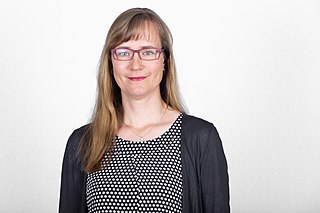
The 2021 Saxony-Anhalt state election was held on 6 June 2021 to elect the 8th Landtag of Saxony-Anhalt. The outgoing government was coalition of the Christian Democratic Union (CDU), Social Democratic Party (SPD), and The Greens, led by Minister-President Reiner Haseloff.

The 2022 Lower Saxony state election was held on 9 October 2022 to elect the 19th Landtag of Lower Saxony. The incumbent government was a coalition of the Social Democratic Party of Germany (SPD) and Christian Democratic Union of Germany (CDU) led by Minister-President Stephan Weil.

In Germany's federal electoral system, a single party or parliamentary group rarely wins an absolute majority of seats in the Bundestag, and thus coalition governments, rather than single-party governments, are the usually expected outcome of a German election. As German political parties are often associated with particular colors, coalitions are frequently given nicknames based on the colors included. Prominent political parties in Germany are the CDU/CSU (black), the SPD (red), the Greens (green), the Left, the AfD (blue), and the FDP (yellow).
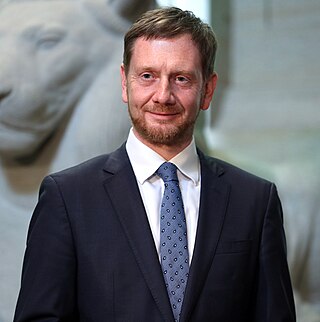
The Second Kretschmer cabinet is the current state government of Saxony, sworn in on 20 December 2019 after Michael Kretschmer was elected as Minister-President of Saxony by the members of the Landtag of Saxony. It is the 10th Cabinet of Saxony.

The Third Woidke cabinet is the current state government of Brandenburg, sworn in on 20 November 2019 after Dietmar Woidke was elected as Minister-President of Brandenburg by the members of the Landtag of Brandenburg. It is the 9th Cabinet of Brandenburg.

The second Weil cabinet was the state government of Lower Saxony between 2017 and 2022, sworn in on 22 November 2017 after Stephan Weil was elected as Minister-President of Lower Saxony by the members of the Landtag of Lower Saxony. It was the 29th Cabinet of Lower Saxony.

The Third Haseloff cabinet is the current state government of Saxony-Anhalt, sworn in on 16 September 2021 after Reiner Haseloff was elected as Minister-President of Saxony-Anhalt by the members of the Landtag of Saxony-Anhalt. It is the 10th Cabinet of Saxony-Anhalt.










